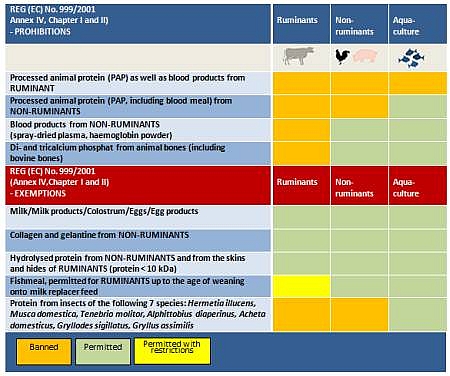You are here:
National Reference Laboratory for Animal Proteins in Feed
The National Reference Laboratory for Animal Protein in Feed at the BfR is responsible for ensuring that all competent monitoring laboratories properly employ the methods that are officially validated in the EU for the detection of prohibited components in feed in Germany.
Background
In the European Union, the feeding of processed animal protein* (PAP) to livestock is prohibited (Regulation (EC) No. 999/2001). Alongside this strict ban there are also exemptions, however, such as milk and eggs and products obtained from them. An overview table on permitted and prohibited substances illustrates the complexity of the legal provisions.
*The term "processed animal protein" is used to mean protein from slaughtering by-products that come from healthy, consumable animals.
Overview of the most important feeding bans and exemptions

The officially validated methods for the detection of banned animal components in feed are based on microscopy and a highly sensitive polymerase chain reaction (PCR) technique for the detection of ruminant DNA (Regulation (EC) No. 152/2009). Information on these methods can be found on the website of the competent European Reference Laboratory in Gembloux, Belgium (http://eurl.craw.eu/en/187/method-of-reference-and-sops), and this information is universally accessible.
Tasks
The National Reference Laboratory for Animal Protein in Feed at the BfR is responsible for ensuring that all competent monitoring laboratories properly employ these methods in Germany.
The NRL performs the following statutory tasks in line with REG (EC) No. 882/2004:
- Support for the German feed monitoring laboratories in the implementation of the official reference methods of the European Reference Laboratory for Animal Protein (EURL-AP; Animal Protein, Walloon Agricultural Research Centre (CRA-W), Gembloux, Belgium) in the form of scientific expertise, regular meetings, training courses and round robin trials
- Ensuring the smooth flow of information between the EURL-AP, the national competent authorities and the official national laboratories
- Method development and validation
- Provision of advice to political decision-makers
The "ANIMAL-ID" research project at the National Reference Laboratory for Animal Proteins
In view of the EU-wide approval in 2013 for processed animal protein of non-ruminants for aquaculture (Regulation (EU) No. 56/2013), the aforementioned official testing methods give rise to a number of problems. Microscopic analysis – which was sufficient before the law was changed – does not permit differentiation based on animal species. Although PCR allows highly sensitive detection of animal species, the method does not provide any information as to whether the detected DNA comes from approved milk powder from cattle or from banned animal meal. This can result in false positive findings. This is why new methods must be developed for routine tests that also permit the tissue-specific detection of the animal species.
One of the current research projects of the NRL is called "ANIMAL-ID" and is focused on the development and validation of innovative methods for the traceability and authentication of animal protein in food and feed.
Based on a resolution adopted by the German Bundestag parliament, the 3-year project from April 2016 to April 2019 is being funded within the context of the Innovation Programme of the Federal Ministry of Food and Agriculture under the funding code 28165035-14.
Press releases
(1)| Date | Title | Keywords |
|---|---|---|
|
06.06.2016 20/2016
|
Adulterated animal-based foods to become easier to detect in future | analysis , food safety |
